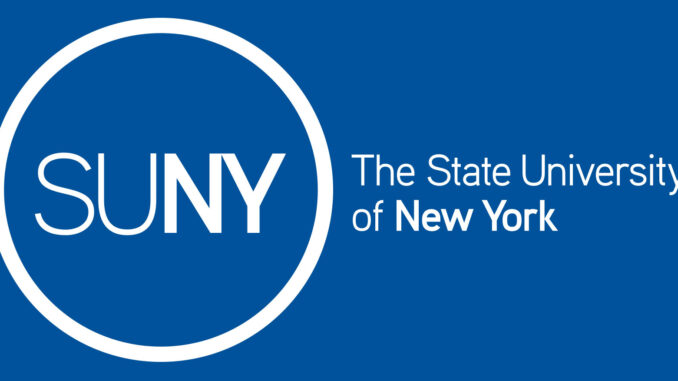
As part of the state’s 2021 Women’s Agenda, Gov. Andrew Cuomo announced a four-point plan to reduce sexual violence at educational institutions on Feb. 23.
The plan includes a National Hub for Policy Development called the Center for Advanced Research in Reducing the Impact of Violence in Education (ARRIVE), expanding the reach of SUNY’s Student Conduct Institute Resources, releasing SUNY’s “nation-leading” Sexual & Interpersonal Violence Prevention and Response (SPARC) course to Colleges and Universities and utilizing a social media campaign called “I’m Asking for a Friend” to raise awareness for sexual assault and dating violence for students.
According to the Rape, Abuse & Incest National Network (RAINN), sexual violence is more prevalent on college campuses compared to other crimes and college-aged victims are less likely to report these crimes.
Thirteen percent of all undergraduate and graduate students experience rape or sexual assault through physical force, violence or incapacitation. Additionally, only 20% of female student sexual violence survivors aged 18 to 24 report the crime to law enforcement, RAINN reported.
According to the Centers for Disease Control’s (CDC) 2016 report on Sexual Violence on Campus: Strategies for Prevention, college-aged students are vulnerable to sexual violence regardless of gender.
One in five women experience attempted or completed sexual assault during college and more than 6% of men in college experience attempted or completed sexual assault. About 23.1% of transgender and nonbinary college students have been sexually assaulted, according to RAINN.
“SUNY has been in the forefront in ending domestic and gender-based violence on campuses,” said SUNY Chancellor Jim Malatras, according to the press release. “We have to repair a lot of damage done by the former federal administration that attempted to reverse policies to keep our students safe on campus.”
The SPARC course was originally developed in 2017 in partnership with CUNY and 188 representatives from colleges and universities have downloaded the course as of April 2019. The course meets training requirements under Title IX; The Celery Act, a law that requires colleges and universities to receive federal funding to communicate a public annual security report to employees and students every Oct. 1.; and Education Law 129-B, which requires colleges to report annual data on domestic violence, dating violence, sexual assault and stalking to the Department of Education.
SUNY’s SPARC can be offered to any college or university for free.
ARRIVE will oversee the development of “enforceable policies,” student-focused trainings and outreach programs to “combat” sexual violence on campuses. ARRIVE will be adopted by the 89 SUNY and CUNY campuses during the Fall 2021 semester and will be made available to private and public university staff who are members of the SUNY Student Conduct Institute.
The SUNY Student Conduct Institute has grown to include 420 colleges, universities and other organizations. By 2022, the institute will look to have 1,000 member institutions to ensure that about 5 million college students will have access to SUNY’s resources on sexual violence.
“Thanks to Gov. Cuomo’s leadership, New York State is a national leader when it comes to protecting the rights of women, ending gender-based violence, and preventing sexual violence,” said Office for the Prevention of Domestic Violence (OPDV) Executive Director Kelli Owens. “OPDV is proud to partner with SUNY/CUNY to continue these efforts. As we re-imagine our systems to deliver more survivor-centered support to victims and survivors of dating and sexual violence, training, outreach and awareness are key to our progress.”
Although Gov. Cuomo announced this four-point plan to prevent sexual violence towards college students, sexual harassment and assault allegations are surfacing about him in recent news.
The former Chief of Staff at New York’s state economic agency, Lindsey Boylan wrote about her experience of sexual harassment from Gov. Cuomo on Feb. 24, a day after he announced his four-point plan. Five other women have come forward about their experience with Cuomo as well.
“My first encounter with the Governor came at Jan. 6, 2016,” Boylan wrote in her post on Medium. “My boss soon informed me that the Governor had a ‘crush’ on me. It was an uncomfortable but all-too-familiar feeling: the struggle to be taken seriously by a powerful man who tied my worth to my body and my appearance.”
In 2016, Stephanie Benton emailed Boylan telling her that Cuomo suggested looking up pictures of his rumored former girlfriend, Lisa Shields, saying that Boyland could be her sister and that Boylan was the “better looking sister.” Cuomo then began to call Boylan “Lisa” in front of her colleagues. “It was degrading,” Boylan wrote.
Boylan also said that Cuomo would go out of his way to touch her lower back, arms and legs. One day when she was leaving the Governor’s office, he stepped in front of her and kissed her and on another occasion, he suggested they play strip poker while she was working within his administration.
“There is a part of me that will never forgive myself for being a victim for so long, for trying to ignore behavior that I knew was wrong,” Boylan wrote. “The Governor exploited my weaknesses, my desire to do good work and to be respected. I was made to believe this was the world I needed to survive in.”

